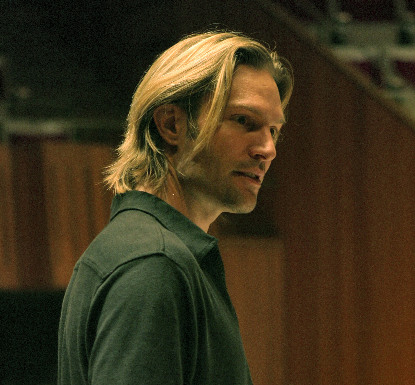 Ever noticed the difference in the Polyphony recording of "i thank you God" and the BYU version? The composer himself explains on his blog, but here's a little of it here:
Ever noticed the difference in the Polyphony recording of "i thank you God" and the BYU version? The composer himself explains on his blog, but here's a little of it here:Then, literally the night before I sent back the final proofs for publication, I freaked. i thank You God was the third in a set of three pieces (the Three Songs of Faith), and it suddenly occurred to me that I could tie the whole set together by quoting the beginning of the first piece, i will wade out, at the end of i thank You God. So I quickly rewrote the "now the ears of my ears" section, echoing the first leaps in i will wade out, and sent it off to the publisher. I can remember feeling actual pride - a very 'scholarly' pride - for so brilliantly and effortlessly manipulating motivic material.Then he heard it about a year later and was conflicted . . . he didn't like it and feared he made a tragic mistake:
And when I heard it, I was horrified. It was ridiculously difficult, and I could see the otherwise excellent choir sweating just to make it sound natural. Much worse, though, was this: it completely masked the meaning of the words. The text became lost in the 'clever' writing, and the most important sentence in the poem just vanished in a fog of academic writing and . . . pride.So, he gave Polyphony a copy of the original version for their recording . . . and then used the relatively new found power of the internet to provide that solution to the rest of us:
So here now, available for everyone, is the insert that restores the original. If you are conducting or singing i thank You God for most this amazing day and are trying to decide which version to do (the published or the 'urtext'), please know that I strongly encourage you to consider the insert.And then, he makes a rather startling statement:
For me, the published version is a version I'd rather never hear again.That is rather profound, I'd say. Mr. Whitacre just showed us a way composers and publishers can correct, manipulate, and simplify portions of their work once they've gone to publication.
Even more interesting is from the comment section of Whitacre's blog post from Jimmy:
I'm sorry you don't like the version that was published originally. I think it's a beautiful musical effect that, though difficult, can grab and hold an audience's attention so that it is more attentive to the wonderful building chords of "open". The chant-like section, as performed by Polyphony, sounds mundane.Fascinating, eh?
Read the whole story here.
i thank you God insert.pdf






1 comment:
As a singer in the Pacific Chorale that has performed and recorded (unreleased) this work, I prefer the original lead-in to the end of the piece. To me it is much more interesting. The new ending is pedantic and almost boring to me. In fact, the first time I sang it in preparation for performing the work in our March 29 concert, I felt very disappointed. I never found it too difficult to sing.
Post a Comment